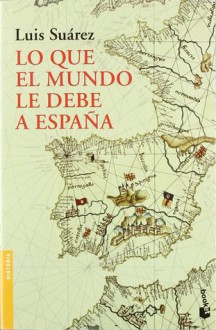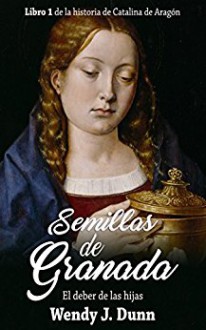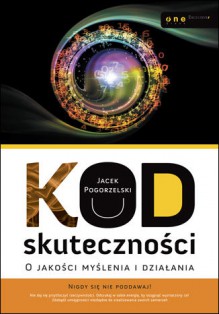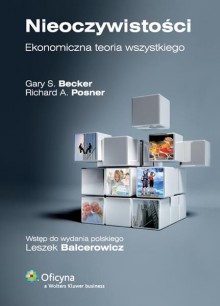
What the World Owes to Spain.
Europe is the consequence of the correlation between 5 principal cultures represented by the 5 principal languages: English, German, French, Italian and Spanish. Every one of them are important to understand how the Western World was built in the shape we know today.
What am I doing reading this book? Essay is not my thing. In fact, I run away from them. When my father first heard I was just reading this he said "Much better than those cheap novels you usually read". I don't repudiate my "noveluchas", if that's what you are thinking. It's just that in these times, when my people is depressed due to the crisis and that sense of inferiority we suffer since... the '98 (1898, not 1998)? The loss of the colonies around 1810-20? I honestly don't know when it all began, but it exists nowadays. We Spaniards criticize our country to the extreme and idealize the rest of the powerful countries in Europe: UK, Germany, France. That's good, because we should be compared to those countries but that's also very bad, because we always think the grass is greener on the other side of the fence. In the end, we have a negative perspective of Spain and a truly positive one of the rest. As the poem says:
Oyendo hablar un hombre, fácil es
saber donde vio la luz del sol
Si alaba Inglaterra, será inglés
Si os habla mal de Prusia, es un francés
y si habla mal de España... es español.
The last sentence: "If he talks badly about Spain, he's Spanish". Truest words ever said. Oh yes, of course we are proud of our food and sports and art and areas declared as World Heritage sites. But when we are out of that, our flag is damned. It's a difficult situation to explain and the only reason I can give now is: We are a country that hasn't assimilated its History. Our complex is so strong we even have shocking advertising campaigns like this one:
Offensive first part:

"I'm sick of Spaniards"
Defensive second part:

"Spaniards made of talent".
This is not a way to offend Spaniards but to make themselves consider how foreigners see them. It's made FOR Spaniards. This campaign wants to promote anonymous talents amongst Spaniards for them to be known.
It's not that I consider Spain superior to other countries. That's not the point of this book either. I totally admire UK, Germany, France and lots of other countries who contributed to how the world is today. But sometimes I forget Spain contributed as much as them. Because sometimes the mood around me passes on me and it's very hard to get rid of it.
Anyway, this is a Spanish book, written by a member of the Real Academia de la Historia, so surely you are wondering, why are you writing in English? The answer is that I was just having a tantrum with my great friend Argona, and as we can't speak the language of the other one, we use English to communicate. That's not an impediment for us to form a friendship. In fact, we are more and more bonded every day. That's my feeling and I'm sure she can relate. Also because we feel our countries are brushed aside in all its culture and legacy. But above all because I want most of people to understand. I will translate this review to Spanish, I just don't know when.
Once upon a time, Franco meant Spain was retarded or something, at least for the Western World. They had a tendency of making movies and if a Spaniard was included it was a "red-neck" who now and then danced flamenco and was mocked by the main characters. Well, I asked my father if he knew about any movie about Spain that showed we were great once upon a time. And he said there is a Cid movie and a Don Quixote movie, and that the first one is starred by Charlton Heston. That is something... but not enough.
It all began with me reading this book and then finding this:
What the United States Owes to SpainThe video of the text is
here in Spanish.
And still, they treat Spain like nothing. How many American movies have you watched about England, Irish immigrants, Scotland, France, Romans with the gladiators, even Alexander the Great and Greeks like 300? Even Russia with the Cold War and Germany deserve a place, although I seriously doubt Germans like being immortalized as Nazis once and again, as well as Russia likes being remembered as the Gulag inferno. When a Spanish movie becomes famous, it's always a contemporary one with weird people by Almodóvar, or the Civil War. Think about Pan's Labyrinth.
But what about Spain from the Hollywood's perspective? I was just asking this to my American teacher and he didn't know what to say. Spain is forgotten and if they remember us, is to add another stereotype. Did you know that the in the movie Knight and Day, the one Tom Cruise starred five years ago, he gets in the middle of the Sanfermines in the city of Sevilla? Sanfermines are ONLY celebrated in Pamplona, a city on the other side of the country. Lots of Spaniards refused to watch the movie because they were so offended!
I was one of those.
Americans love Antique and Medieval Ages and so on, but have you ever seen a film about the tercios españoles? The infantry army who ruled over Europe and were not beaten for 150 years?
This is the first battle they lost. The battle of Rocroi, in the end, Viggo Mortensen says:
"Tell the lord duke of Enghien that we appreciate his words, but this is a Spanish third."
Olé.
Watch the video
here. (The song is not a real one, it was written for a Spanish television series called Águila Roja, but it's still impressive, yeah?)
The thing is, when Spain was fading, England was sunrising. And England really hated us. I mean we helped the States to become independent! Also, Spain and Italy remained truly Catholic, when the rest of Europe rejected that religion and adopted other schools of thought, as Lutero's and the like. That meant Spain was ALWAYS in war and there is no nation that can stand that, centuries of war and blood, if one war finished, another fresh country battled a bleed to death Spain, and that subjugates everyone. The main point is, England became more and more powerful, whereas Spain was just surviving, and as they became powerful, they also wrote History. Winners are the ones who write it, there is no doubt about that. Also, Frenchmen ignored Spanish currents of thought in their Encyclopedia, just because they thought Spain was very inferior to them. After some time it was demonstrated it was not true, but the damage was done. They were just difficult times for Spain and France wasn't that far from England in their ancient hate towards Spain.
The 19th century is what really influenced the modern era, and with England holding the supremacy, Spain was almost synonym of underdevelopment.
But you did you know that the idea of State began in Spain? When the Goths invaded Hispania, in the 5th century, they forgot all about their language, religion and politics and adapted to the Roman organization that governed there. Because Hispania accepted their new "leaders" if and only if they bended to its system. Hispania recognized itself as a nation and consequently there was no choice but to play with its rules. The Goths admitted that and submitted. No small thing.
Spain is also the only country who reconquered a nation invaded by the Islam. Africa never reconquered its previous way of living. Spain did. And that was very important for Europe.
Also, did you know the Monarchy was invented by Spain? Europeans countries copied it afterwards. There were kingdoms but not Monarchy. Monarchy was very innovative.
Did you know the figure of the knight in a shining armor came from Spain? There was a legend that St James had a horse and a spear, and that his gentlemanly behavior made him a superior person. Medieval Ages owes that to Spain. Also, the Way of St James meant forgiveness. It means that you could have been a bad person, but if you are sorry and act in a good way afterwards, you can get forgiveness. Do you realize how important is that?
Did you know the Crusades began with the War of Barbastro against the Moors? Barbastro is in Huesca, Spain. Next time you watch Kingdom of Heaven, remember this.
Did you know that the parliamentary was invented by Spain? In the Kingdom of Leon there were Cortes, in which the third class (common people) was represented. A guy walking the Way of St James's discovered it more than 100 years afterwards and came back to England and that's when the House of Commons began. That guy was Simon of Monfort.
Did you know the number 0 came from Spain? As Spain was invaded by the Islam, all the knowledge from all places of the Mediterranean was kept in convents and a guy decided it was a good idea that Muslims and Jews translated those texts from Arab and Hebrew to Castilian and then monks translated to Latin. Those manuscripts were copied by Europe. One of those texts included the number 0. 0 means infinite. 0 means maths. Aristotle was also known throughout Europe like that. Aristotle means modern science. In Spain the Bible was translated into a vulgar language for the first time.
Did you know that Spain thought that as God gives freedom to people, then people, using the reasoning, could do as they wished? That is really something! As the rest of Europe said "It doesn't matter what we do, because God is the One who decides", Spain said "God gave us freedom, so let's use that freedom". They considered Spain über Catholic as in a bad way but right then it was not negative at all!
That's important also because it meant humans could achieve the Truth, or in other words, people could really understand how the world works, it means, Science. The rest of Europe, as they thought the only Truth can only be given by God, then everything discovered by the human being is only an opinion, but never a truth. Spain dared to say Science is not out of reach for earthly life!
Did you know the Battle of Lepanto was fought by Spain against the Ottoman Empire? Don't dare to say stopping the Turkish from entering Europe is not important. In this battle, Cervantes had his left arm useless and was held captive in Algeria for years, but his right hand wrote Don Quixote, so everything turned out fine.
Also, did you know that Spain held the first university that allowed the study of the human body, in other words, the use of corpses? Vesalio travelled to Spain. Vesalio wrote the first book about the human anatomy. Till then, only Galeno's knowledge was available, and he only could study animals, mostly pigs.
Did you now that the separation of powers also comes from Spain? The typical division of branches is into a legislature, an executive, and a judiciary. The Kingdom of Leon invented it along with the Cortes. John Locke copied it from Spain. Montesquieu copied it from Locke and he became famous.
Spain also had the most free people in comparison to other countries of Europe. When Christians reconquered a piece land from the Muslims, that land had to be owned in order for it to be farmed and defended. That's how lots of people who served others became free and had a propriety they could call theirs. Also, serfdom was abolished much sooner than in the rest of the nations. Even more, there was never a true feudalism in Spain, vassalage was the rule. As opposed to what people think, vassalage is good. It's a pact between two people, a pact where those two people have to be free because otherwise it's slavery. It meant people who compromised in a vassalage were free. Also, vassalage meant lord and vassal have to follow the law, because otherwise the lord is a tyrant, and consequently, he was punished. People were freer than in the rest of Europe!
Also, Spain considered every person has the three principal rights: freedom, life and property. Are you aware Spain was the first country to consider the human rights? English people said: "Those countries overseas are not real people so let's make colonies and subjugate and kill them" whereas Spanish said "Those people are people like us, so we just have to baptize them and built kingdoms for them (cities, universities, etc) and miscegenation is good". Spain didn't have colonies in America, they were kingdoms. It's a big difference and it was totally innovative. Of course there were abuses. The human being is not perfect.
It wasn't an exemplary behavior. But it wasn't the worst. Not at all.
There is this Frenchman, Hippolyte Taine, who said "There is a superior moment in the human species: the Spain from 1500 to 1700".
Magallanes and Elcano achieved the first circumnavigation of the Earth. The following expeditions by Spain were useful for Darwin's trips.
I get the impression England feels superior than Spain and thinks pirates and corsairs like Drake were heroes, when they also were slave traders. England beat the Invincible Army in the 16th century but the weather was terrible and the Spanish boats arrived in a bad shape. That wasn't what decided it all, because Spain kept beating England afterwards but Englishmen feels very proud of it. Did you know that in the 18th century England tried to beat Spain with a far superior force? They sent the news that Cartagena (Colombia) was conquered even before they attacked it. Such an arrogance! I copy from Wikipedia:
"The Battle of Cartagena pitted a British invasion force of 186 ships including: 29 Ships of the Line; 22 frigates, 2 hospital ships, various fire ships and bomb ships armed with a total of some 2,000 cannon; 80 troop transports and 50 merchant ships. There were at least 27,400 military personnel, of which the land force totaled 12,000 including: two British regular infantry regiments, the 15th Foot and 24th Foot, 6,000 newly raised marines and some 3,600 American colonial troops, commanded by Colonel William Gooch (the Lieutenant Governor of Virginia), in four battalions designated as the 43rd Regiment of Foot, arriving from the North American colonies on another 40 transports.
The Spanish force defending Cartagena was composed of 2,700 to 3,000 Spanish regulars from the regiments Aragon, España and that of Toledo, Lisboa and Navarra just arrived in October 1740, brought by Vice-admiral Torres; a colonial regiment from Cartagena; an unspecified number of sailors; 5 companies of militia and 600 Indian archers, perhaps 4,000 to 6,000 defenders, manning 6 Ships of the Line and strategic fortifications — under the command of the Governor General of Cartagena, Don Blas de Lezo and the Viceroy of New Granada, Sebastián de Eslava. Blas de Lezo, a Basque, was an experienced, wily and tenacious Spanish Naval commander, whose previous career was as daring and spectacular as any naval officer of his day. Lezo, who had lost an arm, a leg and an eye in the service of Spain, made use of every advantage, strategy and tactic available to him."
And then,
"When the embarrassing news of the outcome reached London some weeks later, the British government removed these medals and prohibited the news from being disclosed and published."
That means England doesn't remember the shameful failure.
Alatriste movie, from the end of it on, is heading to an era when Spain was going downhill, the second half of the 17th century. However, in the 18th century Spain was regaining power and becoming the most powerful nation again, but the French Revolution came and that cut short every development it was achieving. Spain had big plans but France spoiled it all. As Quevedo said, the Spanish formula failed, but it doesn't mean they weren't right. But also then we were important: we beat Napoleone. Spain was the first country to beat Napoleone and it was thanks to populace. The 2nd and 3rd May in 1808 were the days when, for the first time populace fought a Revolution and that became the first guerrilla warfare. That was innovative for Europe, but it left Spain in awful conditions afterwards. The Constitution of Cádiz in 1812 was super awesome and the most progressive. Did you know that the term "liberal" comes from the Spanish language? That's meaningful. But then Ferdinand VII became king of a broken nation that soon lost most of its colonies and that was awful. The 19th century is super sad and that's partly what gave Spain bad reputation. Franco didn't help.
Spain was neutral in both World Wars. And that's a service of inestimable value. Spain didn't bend to any of the totalitarianisms that ruled then. Franco gained time putting Hitler off and mediating in the conditions imposed in France after Germany invaded the country. Spain participated in the salvation of prisoners and civils. Spain didn't participate in the shame of the Holocaust, but helped Jews and lots more, even those with no Spanish bloodline, to escape throughout the Peninsula. But Spain didn't receive any help, no Marshall Plan was given. The dictatorship was a hard period but little by little Spain was getting closer to Europe, in such a way that the Transition from such Regimen into a democracy was a continuation and not a rupture. There was no violence and that was a good lesson for Europe. After entering the European Union, Spain was amongst the most benefited countries and its growth has been astonishing.
Spain is not only a place of culture and a cheerful way of living. We invented, we built, we innovated, we have left a huge legacy for the world. Not only the language, which is now the second most spoken language in the world (after Mandarine Chinese), but also fascinating and admirable ways of living, of thinking, of ruling, of feeling. Spain invented, even in its lowest moments, because as we say "El hambre agudiza el ingenio" ("Necessity is the mother of invention"): autogyro, submarine, disposable syringe, folding-blade knife, lollipop, Molotov cocktail, digital calculator, electronic book, radio, stapler, pencil sharpener, the first game against a computer, cable car, mop, cigarrette, remote control, epidural anesthesia, laryngoscope, arquebus, modern train, astronaut costume, pressure cooker and lots more. Even the amphibious disembark in the D-Day was inspired in the Alhucemas landing. Neuron doctrine by Ramón y Cajal is Spanish.
In spite of it all, the legacy of the Black Legend still persists:
"The basic premise of the Black Legend is that Spaniards have shown themselves, historically, to be uniquely cruel, bigoted, tyrannical, obscurantists, lazy, fanatical, greedy, and treacherous; that is, that they differ so much from other peoples in these traits that Spaniards and Spanish history must be viewed and understood in terms not ordinarily used in describing and interpreting other people."
Only ignorants believe the comment above.
After all this speech, I must say something about the only fact the world usually remembers about Spain: the Spanish Inquisition. It's true the Catholic Church caused a big harm to all the Spanish progress and influenced most of the reputation this country had and still has, as its role is not the repression. Ok, that was a mistake, but hey, Spain wasn't the one that invented the Inquisition, and wasn't the only one who imposed it, either. We were the last nation to abolish it, that's true. But overall, the good contributions surpass the bad ones.
By a long shot.


 Log in with Facebook
Log in with Facebook 











